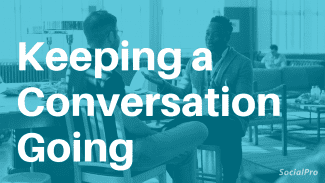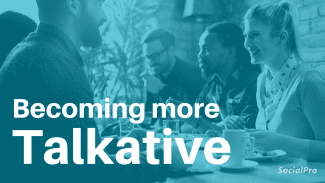Do you not know what to say when a conversation gets awkward or tense? Do you wish you knew how to join a conversation without making it awkward? When awkward tension creeps into a conversation, it can make it hard to talk to people, connect, and make friends.
In this article, you will learn strategies to help your conversations flow more smoothly and ways to make a quick recovery after an awkward moment.
If awkwardness makes a regular appearance in your social life, you might often feel the urge to run and hide rather than endure the painful silences and weird vibes that you experience in conversations. Your conversations will feel less forced, more natural, and less awkward with these skills and strategies.
1. Focus on being friendly
Smarts, looks, and swag can make people jealous, insecure, or spark competition, but being friendly puts people at ease. When people feel at ease, they may be more forgiving of mistakes and awkwardness. Giving compliments, being positive or helpful towards another person, and using humor are all great ways to get people to open up and relax around you.[1] Being friendly and kind can also help to soften the blow and reduce discomfort during difficult conversations, making them less awkward.
2. Speak up early
If you’ve ever joined a group or class and waited too long to speak, you know it doesn’t get any easier or less awkward when you wait. Being silent for too long makes things awkward, creates tension, and makes people unsure of how to interact with you.[1] Make a point to introduce yourself early, shake hands with people, and don’t wait to join a group conversation.
3. Clarify when needed
If you tend to rush your words or speak too fast when you are nervous, you might trip on your words or speak in ways that are hard to understand. When others look confused, or you think you’ve been misunderstood, don’t ignore these social cues. Instead, get ahead of the problem by clarifying what you meant or intended to say. If you have trouble speaking fluently, try to slow down, pause, and clarify when you don’t feel like you are being clear.
4. Keep people talking
Because most awkwardness stems from being self-conscious or too focused on yourself, getting other people talking can take pressure off and help you feel more comfortable.[1] Most people like talking about themselves and enjoy the attention of a good listener. Research supports this, showing that people who are curious about others and ask more questions tend to be more well-liked than those who don’t ask questions.[2]
5. Use silence as punctuation
People who feel awkward tend to avoid silence like the plague, but this can make things more awkward and forced by rushing the conversation and making you more likely to trip over your words. With practice, you can become more comfortable with silence and even learn how to use it to become a clearer, more persuasive speaker. To practice, try using silence to emphasize something you said or to invite others into the conversation.
6. Find a suitable topic
Sometimes, the reason a conversation feels awkward is that you haven’t found the right topic.[3] The best topics for conversation are ones that you and the other person have a common interest in, which will often lead to more natural conversations.[1] Watch for subtle cues that signal they are interested in a topic, like noticing when they lean in, use their hands more, make eye contact, or seem eager to speak.
7. Increase your range of expression
When you aren’t expressive enough, this can actually make things more awkward by making it harder for others to read them, which can cause people to feel less comfortable and relaxed. People rely on these nonverbal cues to understand what you mean when you speak, so being expressive is the key to being understood. If you are in an awkward text conversation, sometimes a picture, meme, emoji, or GIF can do the trick, while also adding humor to the exchange.
8. Don’t force the conversation
There is nothing more awkward than overstaying your welcome or trying desperately to revive a conversation when the other person no longer feels like talking. Getting better at reading social cues can help you understand when it’s time to end a conversation before things get too awkward.[4] For example, notice if someone seems busy, distracted, or checks their phone a lot, and consider saying, “I’ll let you go” or, “Let’s chat about this later.”
9. Wait out awkward pauses
Sometimes, conversations feel awkward because you feel obligated to fill in every silence or awkward pause. Sometimes, getting out of the awkward zone is as easy as waiting a few seconds to see where a conversation goes. When you wait before automatically filling in the spaces, other people will often jump in to speak. Often, getting through these initial awkward moments will lead to more natural and enjoyable conversations in the future.[1]
10. Acknowledge the elephant in the room
When there’s an awkward tension, sometimes it’s because there’s something obvious going on that no one is acknowledging. It might be really bad food at a restaurant or someone screaming in the background during a work meeting or first date. Using humor to address the elephant in the room can make things less awkward for everyone while also lightening the mood.
11. Acknowledge the awkwardness
An awkward moment does not have to mean the death of a conversation, first date, or your reputation. If you know what to say when a conversation gets awkward, sometimes it’s OK to play the awkward card and just call it out. This can relieve tension, lighten the mood, and help you just move on instead of getting stuck.[1] You could just say, “This is awkward, let’s restart…” on a first date or embrace it by saying, “Yeah I’m a little awkward.”
12. Stay in the moment
Rehearsing conversations and replaying awkward bloopers or imagining them in the future can worsen anxiety and awkwardness by keeping you in the past or the future. Staying fully focused on the moment can help you reduce your anxiety and interact in more normal and natural ways.[5] Use mindfulness skills to help you stay in the moment by focusing on your surroundings, the other person, or use one of your 5 senses to ground you.
13. Avoid getting too serious
Conversations can feel awkward when they get too serious, deep, or sensitive too quickly. If you are talking with strangers, acquaintances at work, or people you don’t know well, it’s a good idea to avoid controversial topics. Controversial topics go against social norms, which is one of the main causes of socially awkward or uncomfortable moments.[1]
Here are some topics to avoid discussing with people you don’t know well:
- Politics, religion, sex, or other controversial topics
- Oversharing about your personal life or problems
- Topics that spark sadness, anger, or other difficult emotions
Final thoughts
Awkwardness can be uncomfortable, but it doesn’t have to be the death of your social life. In fact, sometimes it’s possible to make a recovery from an awkward exchange by making a joke, changing the topic, or just waiting out the awkward silence. Working through these moments will make it easier to have conversations that feel enjoyable and natural instead of awkward and uncomfortable.
Common questions about awkward conversations
What causes awkwardness?
Awkwardness is often caused by feeling self-conscious, nervous, or socially anxious. These feelings cause you to feel less confident, more pressured, and more likely to notice any small mistake or weird moment, which often makes you feel and act more awkwardly.[1]
Why are my conversations so awkward?
If your conversations feel awkward, it might be because of the things you say or do when you feel nervous. For example, rushing to fill silences or trying too hard to be liked can make your conversations feel more forced and awkward.
How do you break an awkward silence in text?
Breaking an awkward silence via text can be as simple as sending a question mark, a “…” or asking, “Everything ok?” when you don’t get a reply. Sometimes, sending an emoji, meme, or GIF can be a great way to respond to awkward text silences without making things too serious.
Is awkward silence a bad sign?
Awkward silences can feel like a bad thing because they tend to be uncomfortable, but often they are just a sign that you and another person are getting to know each other. Making it through these awkward moments often leads to more natural and easy conversations in the future.
What do you say when a conversation gets awkward?
Depending on the situation, you can either ignore awkwardness by changing the topic or call it out directly. Sometimes, sitting with the silence for a moment helps it go away on its own. Other times, awkwardness can be a cue to end or pause the conversation.













I love your Quizzes